Ethical Practices in Business: Case Study, Analysis, and Discussion
VerifiedAdded on 2021/06/16
|8
|2234
|26
Essay
AI Summary
This essay delves into the realm of ethical practices in business, employing a case study to illustrate key concepts. The case revolves around a company's decision to relocate and its implications on labor practices, specifically focusing on the ethical dilemma of hiring younger workers at lower wages. The essay explores non-ethical issues, identifies the ethical dilemma, and defines ethical relativism and moral universalism. It examines how these principles apply to the case scenario, concluding that the scenario aligns with ethical relativism due to the differing ethical beliefs across societies. The essay also provides a comprehensive overview of the relevant literature, including definitions, discussions, and real-world examples to support the arguments.
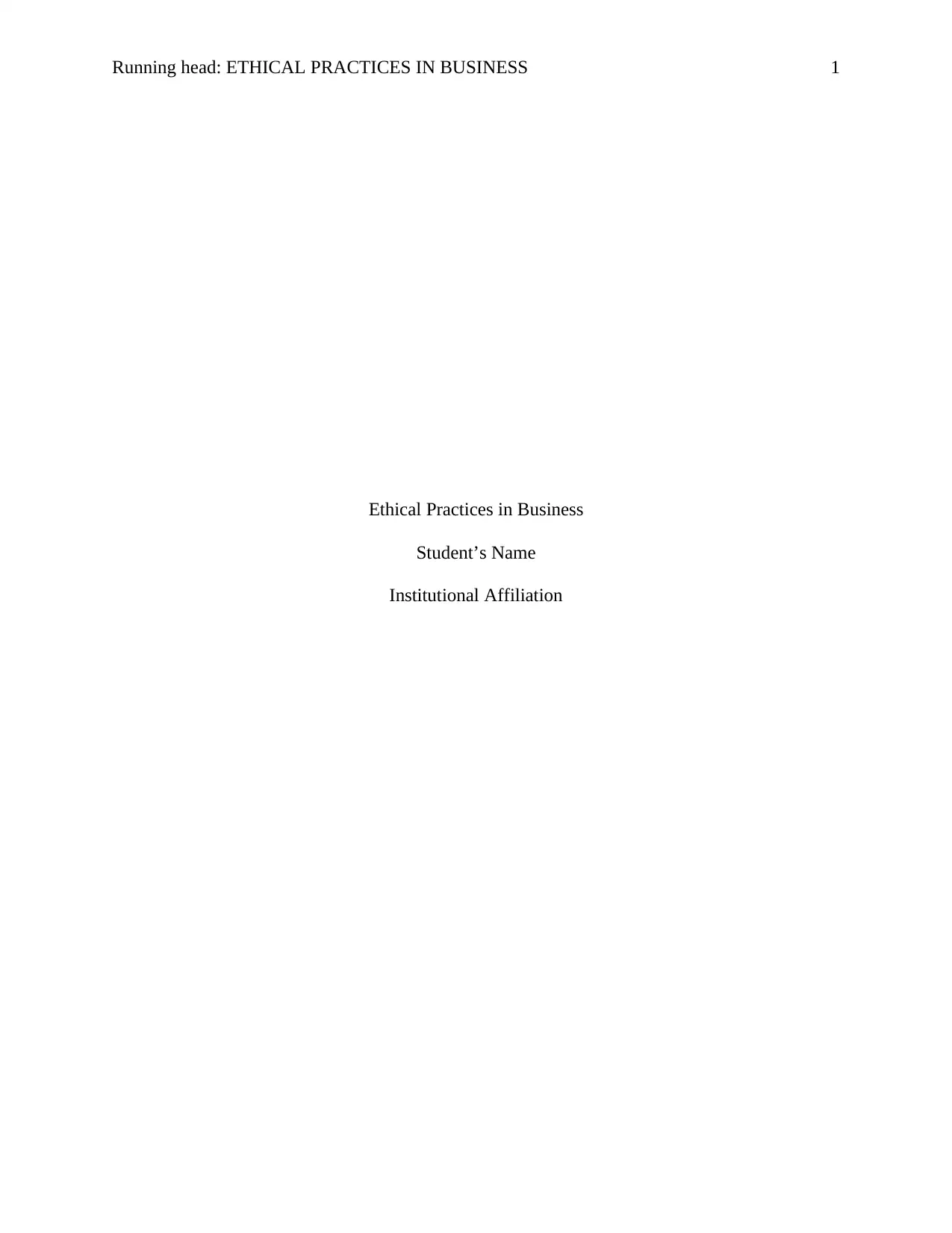
Running head: ETHICAL PRACTICES IN BUSINESS 1
Ethical Practices in Business
Student’s Name
Institutional Affiliation
Ethical Practices in Business
Student’s Name
Institutional Affiliation
Paraphrase This Document
Need a fresh take? Get an instant paraphrase of this document with our AI Paraphraser
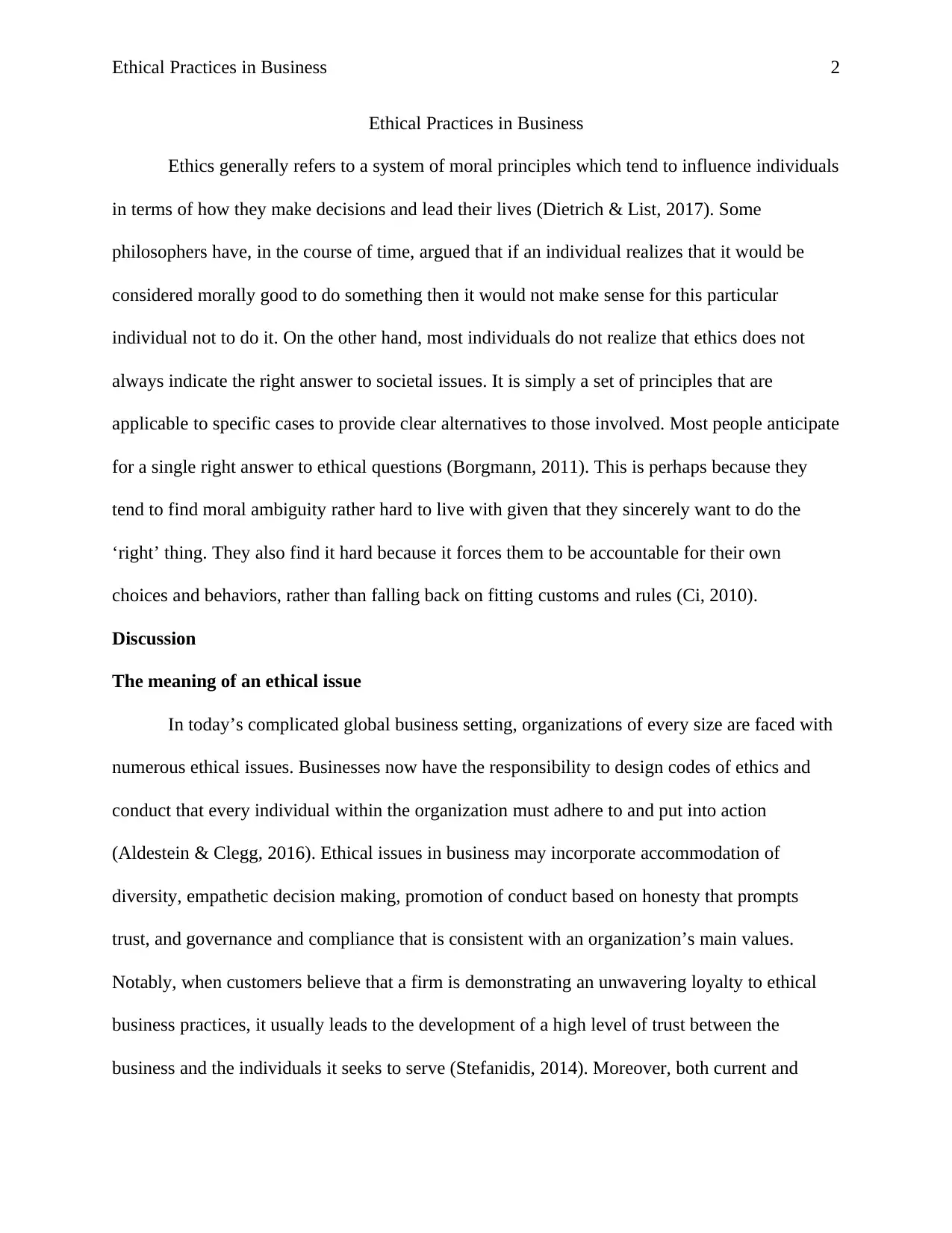
Ethical Practices in Business 2
Ethical Practices in Business
Ethics generally refers to a system of moral principles which tend to influence individuals
in terms of how they make decisions and lead their lives (Dietrich & List, 2017). Some
philosophers have, in the course of time, argued that if an individual realizes that it would be
considered morally good to do something then it would not make sense for this particular
individual not to do it. On the other hand, most individuals do not realize that ethics does not
always indicate the right answer to societal issues. It is simply a set of principles that are
applicable to specific cases to provide clear alternatives to those involved. Most people anticipate
for a single right answer to ethical questions (Borgmann, 2011). This is perhaps because they
tend to find moral ambiguity rather hard to live with given that they sincerely want to do the
‘right’ thing. They also find it hard because it forces them to be accountable for their own
choices and behaviors, rather than falling back on fitting customs and rules (Ci, 2010).
Discussion
The meaning of an ethical issue
In today’s complicated global business setting, organizations of every size are faced with
numerous ethical issues. Businesses now have the responsibility to design codes of ethics and
conduct that every individual within the organization must adhere to and put into action
(Aldestein & Clegg, 2016). Ethical issues in business may incorporate accommodation of
diversity, empathetic decision making, promotion of conduct based on honesty that prompts
trust, and governance and compliance that is consistent with an organization’s main values.
Notably, when customers believe that a firm is demonstrating an unwavering loyalty to ethical
business practices, it usually leads to the development of a high level of trust between the
business and the individuals it seeks to serve (Stefanidis, 2014). Moreover, both current and
Ethical Practices in Business
Ethics generally refers to a system of moral principles which tend to influence individuals
in terms of how they make decisions and lead their lives (Dietrich & List, 2017). Some
philosophers have, in the course of time, argued that if an individual realizes that it would be
considered morally good to do something then it would not make sense for this particular
individual not to do it. On the other hand, most individuals do not realize that ethics does not
always indicate the right answer to societal issues. It is simply a set of principles that are
applicable to specific cases to provide clear alternatives to those involved. Most people anticipate
for a single right answer to ethical questions (Borgmann, 2011). This is perhaps because they
tend to find moral ambiguity rather hard to live with given that they sincerely want to do the
‘right’ thing. They also find it hard because it forces them to be accountable for their own
choices and behaviors, rather than falling back on fitting customs and rules (Ci, 2010).
Discussion
The meaning of an ethical issue
In today’s complicated global business setting, organizations of every size are faced with
numerous ethical issues. Businesses now have the responsibility to design codes of ethics and
conduct that every individual within the organization must adhere to and put into action
(Aldestein & Clegg, 2016). Ethical issues in business may incorporate accommodation of
diversity, empathetic decision making, promotion of conduct based on honesty that prompts
trust, and governance and compliance that is consistent with an organization’s main values.
Notably, when customers believe that a firm is demonstrating an unwavering loyalty to ethical
business practices, it usually leads to the development of a high level of trust between the
business and the individuals it seeks to serve (Stefanidis, 2014). Moreover, both current and
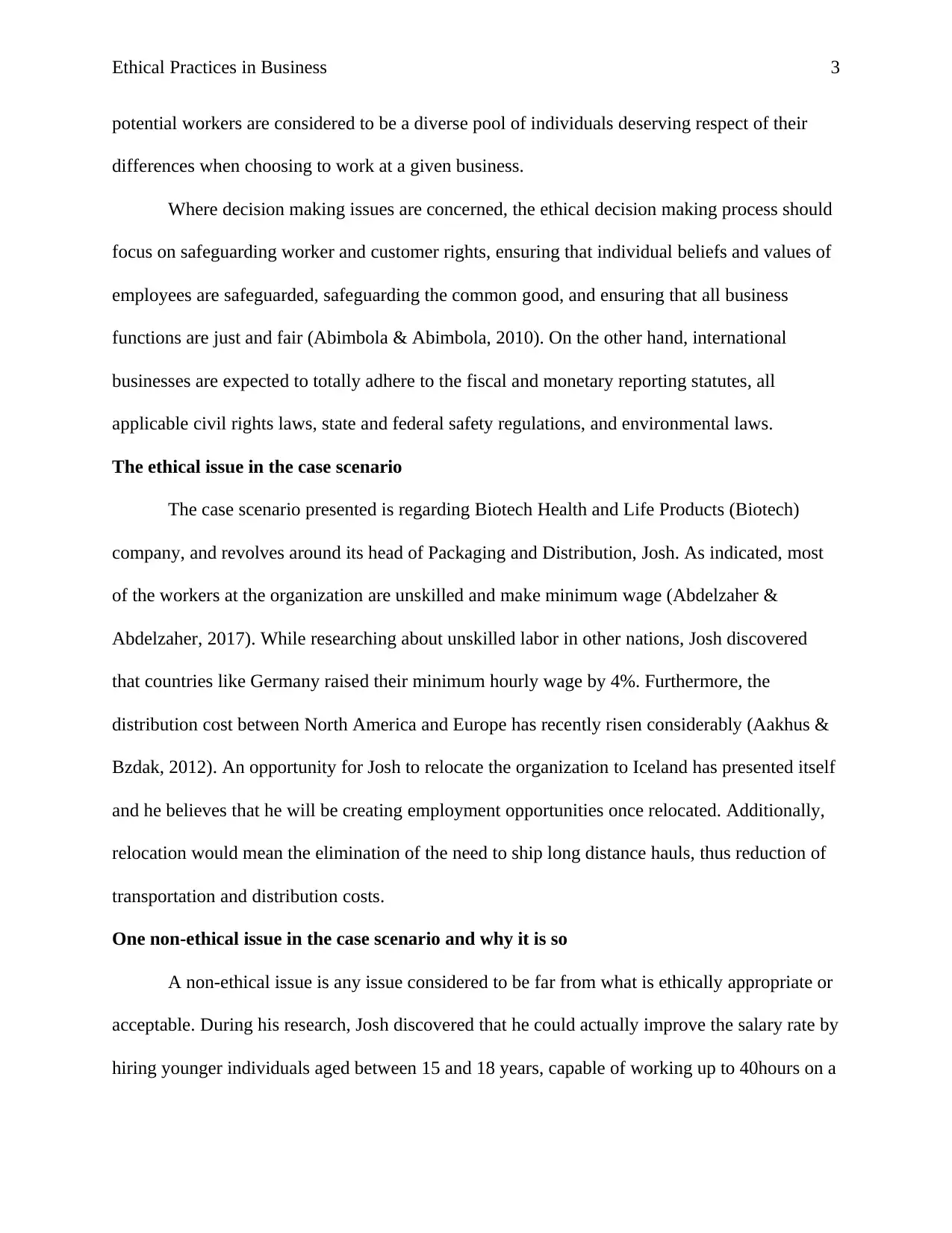
Ethical Practices in Business 3
potential workers are considered to be a diverse pool of individuals deserving respect of their
differences when choosing to work at a given business.
Where decision making issues are concerned, the ethical decision making process should
focus on safeguarding worker and customer rights, ensuring that individual beliefs and values of
employees are safeguarded, safeguarding the common good, and ensuring that all business
functions are just and fair (Abimbola & Abimbola, 2010). On the other hand, international
businesses are expected to totally adhere to the fiscal and monetary reporting statutes, all
applicable civil rights laws, state and federal safety regulations, and environmental laws.
The ethical issue in the case scenario
The case scenario presented is regarding Biotech Health and Life Products (Biotech)
company, and revolves around its head of Packaging and Distribution, Josh. As indicated, most
of the workers at the organization are unskilled and make minimum wage (Abdelzaher &
Abdelzaher, 2017). While researching about unskilled labor in other nations, Josh discovered
that countries like Germany raised their minimum hourly wage by 4%. Furthermore, the
distribution cost between North America and Europe has recently risen considerably (Aakhus &
Bzdak, 2012). An opportunity for Josh to relocate the organization to Iceland has presented itself
and he believes that he will be creating employment opportunities once relocated. Additionally,
relocation would mean the elimination of the need to ship long distance hauls, thus reduction of
transportation and distribution costs.
One non-ethical issue in the case scenario and why it is so
A non-ethical issue is any issue considered to be far from what is ethically appropriate or
acceptable. During his research, Josh discovered that he could actually improve the salary rate by
hiring younger individuals aged between 15 and 18 years, capable of working up to 40hours on a
potential workers are considered to be a diverse pool of individuals deserving respect of their
differences when choosing to work at a given business.
Where decision making issues are concerned, the ethical decision making process should
focus on safeguarding worker and customer rights, ensuring that individual beliefs and values of
employees are safeguarded, safeguarding the common good, and ensuring that all business
functions are just and fair (Abimbola & Abimbola, 2010). On the other hand, international
businesses are expected to totally adhere to the fiscal and monetary reporting statutes, all
applicable civil rights laws, state and federal safety regulations, and environmental laws.
The ethical issue in the case scenario
The case scenario presented is regarding Biotech Health and Life Products (Biotech)
company, and revolves around its head of Packaging and Distribution, Josh. As indicated, most
of the workers at the organization are unskilled and make minimum wage (Abdelzaher &
Abdelzaher, 2017). While researching about unskilled labor in other nations, Josh discovered
that countries like Germany raised their minimum hourly wage by 4%. Furthermore, the
distribution cost between North America and Europe has recently risen considerably (Aakhus &
Bzdak, 2012). An opportunity for Josh to relocate the organization to Iceland has presented itself
and he believes that he will be creating employment opportunities once relocated. Additionally,
relocation would mean the elimination of the need to ship long distance hauls, thus reduction of
transportation and distribution costs.
One non-ethical issue in the case scenario and why it is so
A non-ethical issue is any issue considered to be far from what is ethically appropriate or
acceptable. During his research, Josh discovered that he could actually improve the salary rate by
hiring younger individuals aged between 15 and 18 years, capable of working up to 40hours on a
⊘ This is a preview!⊘
Do you want full access?
Subscribe today to unlock all pages.

Trusted by 1+ million students worldwide
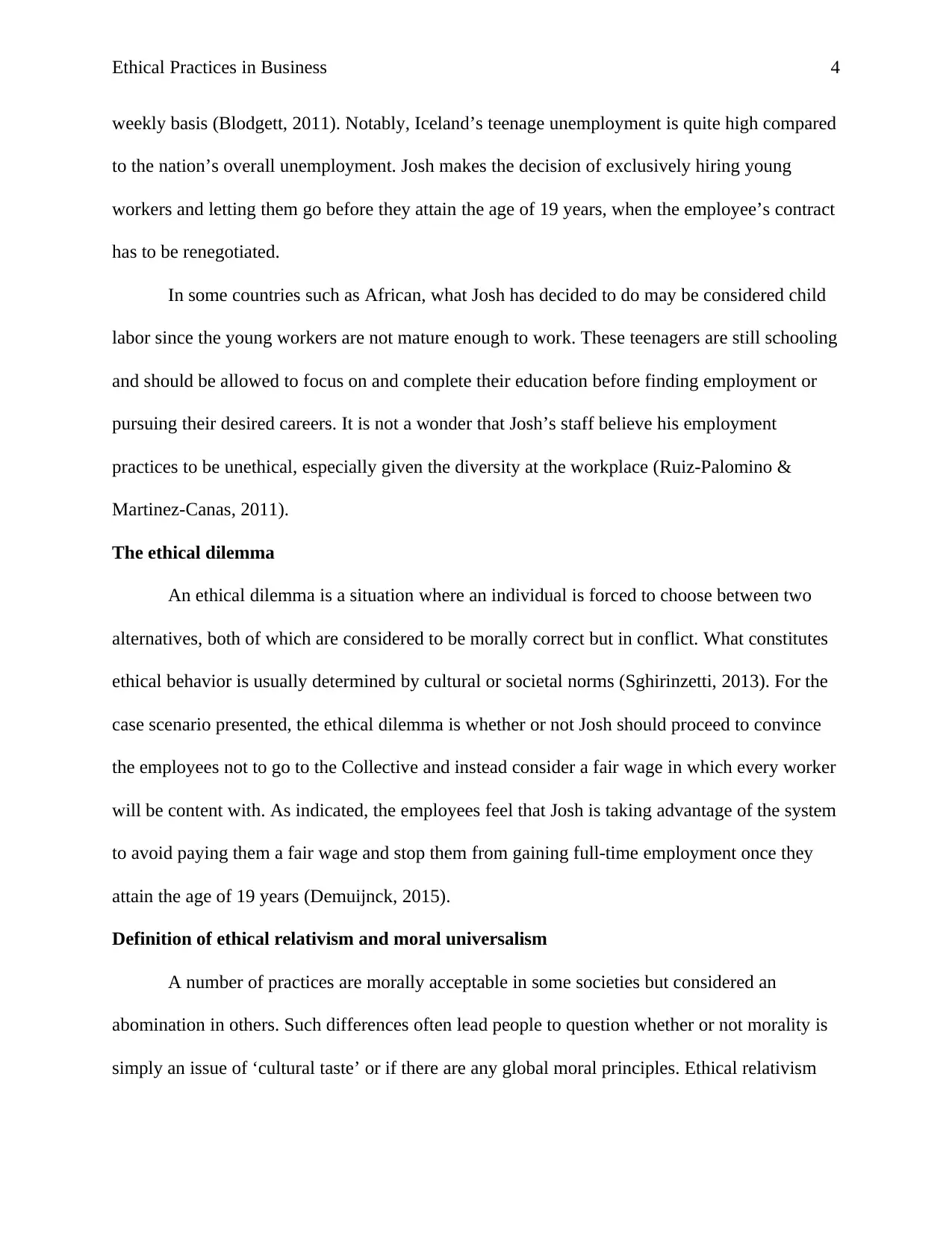
Ethical Practices in Business 4
weekly basis (Blodgett, 2011). Notably, Iceland’s teenage unemployment is quite high compared
to the nation’s overall unemployment. Josh makes the decision of exclusively hiring young
workers and letting them go before they attain the age of 19 years, when the employee’s contract
has to be renegotiated.
In some countries such as African, what Josh has decided to do may be considered child
labor since the young workers are not mature enough to work. These teenagers are still schooling
and should be allowed to focus on and complete their education before finding employment or
pursuing their desired careers. It is not a wonder that Josh’s staff believe his employment
practices to be unethical, especially given the diversity at the workplace (Ruiz-Palomino &
Martinez-Canas, 2011).
The ethical dilemma
An ethical dilemma is a situation where an individual is forced to choose between two
alternatives, both of which are considered to be morally correct but in conflict. What constitutes
ethical behavior is usually determined by cultural or societal norms (Sghirinzetti, 2013). For the
case scenario presented, the ethical dilemma is whether or not Josh should proceed to convince
the employees not to go to the Collective and instead consider a fair wage in which every worker
will be content with. As indicated, the employees feel that Josh is taking advantage of the system
to avoid paying them a fair wage and stop them from gaining full-time employment once they
attain the age of 19 years (Demuijnck, 2015).
Definition of ethical relativism and moral universalism
A number of practices are morally acceptable in some societies but considered an
abomination in others. Such differences often lead people to question whether or not morality is
simply an issue of ‘cultural taste’ or if there are any global moral principles. Ethical relativism
weekly basis (Blodgett, 2011). Notably, Iceland’s teenage unemployment is quite high compared
to the nation’s overall unemployment. Josh makes the decision of exclusively hiring young
workers and letting them go before they attain the age of 19 years, when the employee’s contract
has to be renegotiated.
In some countries such as African, what Josh has decided to do may be considered child
labor since the young workers are not mature enough to work. These teenagers are still schooling
and should be allowed to focus on and complete their education before finding employment or
pursuing their desired careers. It is not a wonder that Josh’s staff believe his employment
practices to be unethical, especially given the diversity at the workplace (Ruiz-Palomino &
Martinez-Canas, 2011).
The ethical dilemma
An ethical dilemma is a situation where an individual is forced to choose between two
alternatives, both of which are considered to be morally correct but in conflict. What constitutes
ethical behavior is usually determined by cultural or societal norms (Sghirinzetti, 2013). For the
case scenario presented, the ethical dilemma is whether or not Josh should proceed to convince
the employees not to go to the Collective and instead consider a fair wage in which every worker
will be content with. As indicated, the employees feel that Josh is taking advantage of the system
to avoid paying them a fair wage and stop them from gaining full-time employment once they
attain the age of 19 years (Demuijnck, 2015).
Definition of ethical relativism and moral universalism
A number of practices are morally acceptable in some societies but considered an
abomination in others. Such differences often lead people to question whether or not morality is
simply an issue of ‘cultural taste’ or if there are any global moral principles. Ethical relativism
Paraphrase This Document
Need a fresh take? Get an instant paraphrase of this document with our AI Paraphraser
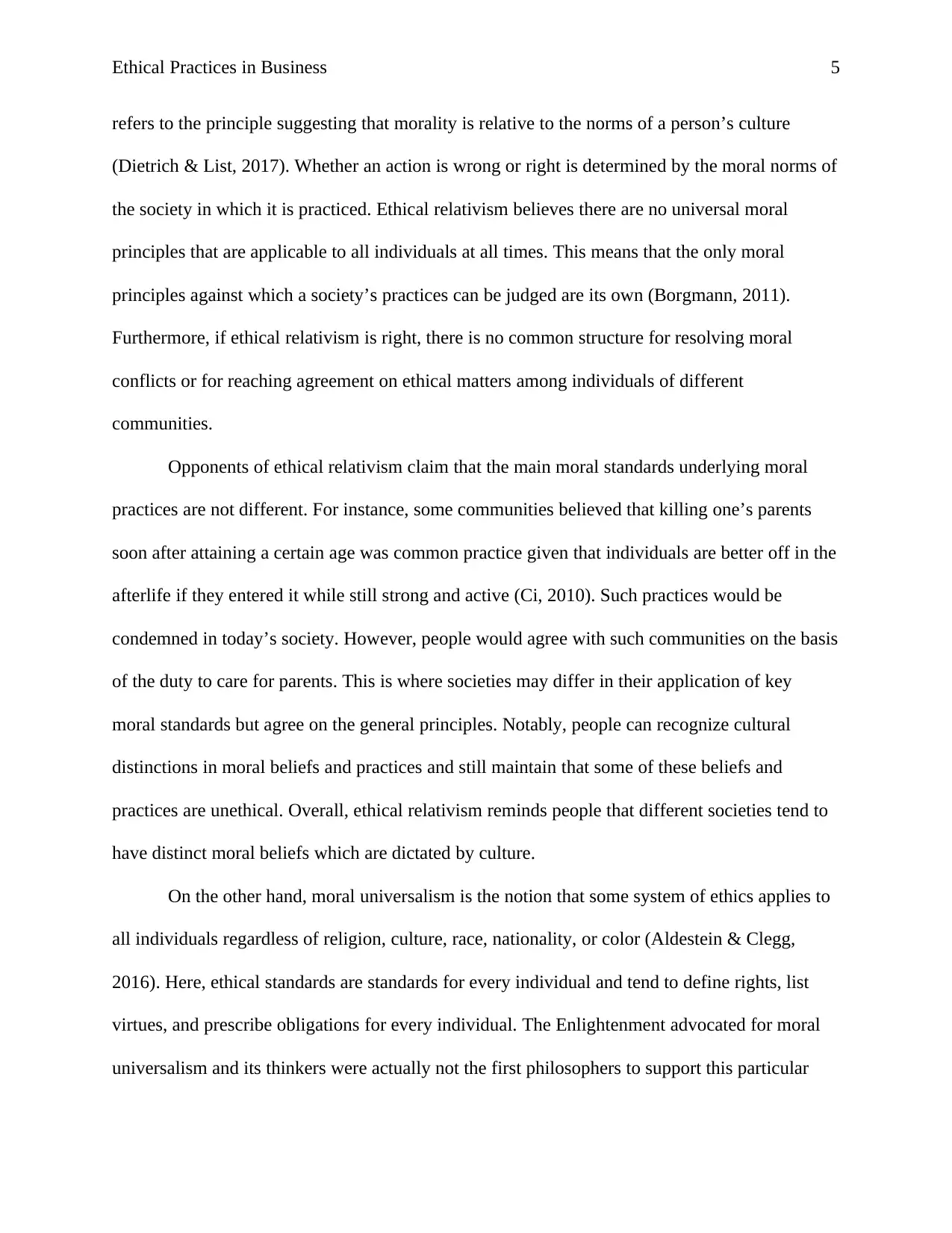
Ethical Practices in Business 5
refers to the principle suggesting that morality is relative to the norms of a person’s culture
(Dietrich & List, 2017). Whether an action is wrong or right is determined by the moral norms of
the society in which it is practiced. Ethical relativism believes there are no universal moral
principles that are applicable to all individuals at all times. This means that the only moral
principles against which a society’s practices can be judged are its own (Borgmann, 2011).
Furthermore, if ethical relativism is right, there is no common structure for resolving moral
conflicts or for reaching agreement on ethical matters among individuals of different
communities.
Opponents of ethical relativism claim that the main moral standards underlying moral
practices are not different. For instance, some communities believed that killing one’s parents
soon after attaining a certain age was common practice given that individuals are better off in the
afterlife if they entered it while still strong and active (Ci, 2010). Such practices would be
condemned in today’s society. However, people would agree with such communities on the basis
of the duty to care for parents. This is where societies may differ in their application of key
moral standards but agree on the general principles. Notably, people can recognize cultural
distinctions in moral beliefs and practices and still maintain that some of these beliefs and
practices are unethical. Overall, ethical relativism reminds people that different societies tend to
have distinct moral beliefs which are dictated by culture.
On the other hand, moral universalism is the notion that some system of ethics applies to
all individuals regardless of religion, culture, race, nationality, or color (Aldestein & Clegg,
2016). Here, ethical standards are standards for every individual and tend to define rights, list
virtues, and prescribe obligations for every individual. The Enlightenment advocated for moral
universalism and its thinkers were actually not the first philosophers to support this particular
refers to the principle suggesting that morality is relative to the norms of a person’s culture
(Dietrich & List, 2017). Whether an action is wrong or right is determined by the moral norms of
the society in which it is practiced. Ethical relativism believes there are no universal moral
principles that are applicable to all individuals at all times. This means that the only moral
principles against which a society’s practices can be judged are its own (Borgmann, 2011).
Furthermore, if ethical relativism is right, there is no common structure for resolving moral
conflicts or for reaching agreement on ethical matters among individuals of different
communities.
Opponents of ethical relativism claim that the main moral standards underlying moral
practices are not different. For instance, some communities believed that killing one’s parents
soon after attaining a certain age was common practice given that individuals are better off in the
afterlife if they entered it while still strong and active (Ci, 2010). Such practices would be
condemned in today’s society. However, people would agree with such communities on the basis
of the duty to care for parents. This is where societies may differ in their application of key
moral standards but agree on the general principles. Notably, people can recognize cultural
distinctions in moral beliefs and practices and still maintain that some of these beliefs and
practices are unethical. Overall, ethical relativism reminds people that different societies tend to
have distinct moral beliefs which are dictated by culture.
On the other hand, moral universalism is the notion that some system of ethics applies to
all individuals regardless of religion, culture, race, nationality, or color (Aldestein & Clegg,
2016). Here, ethical standards are standards for every individual and tend to define rights, list
virtues, and prescribe obligations for every individual. The Enlightenment advocated for moral
universalism and its thinkers were actually not the first philosophers to support this particular
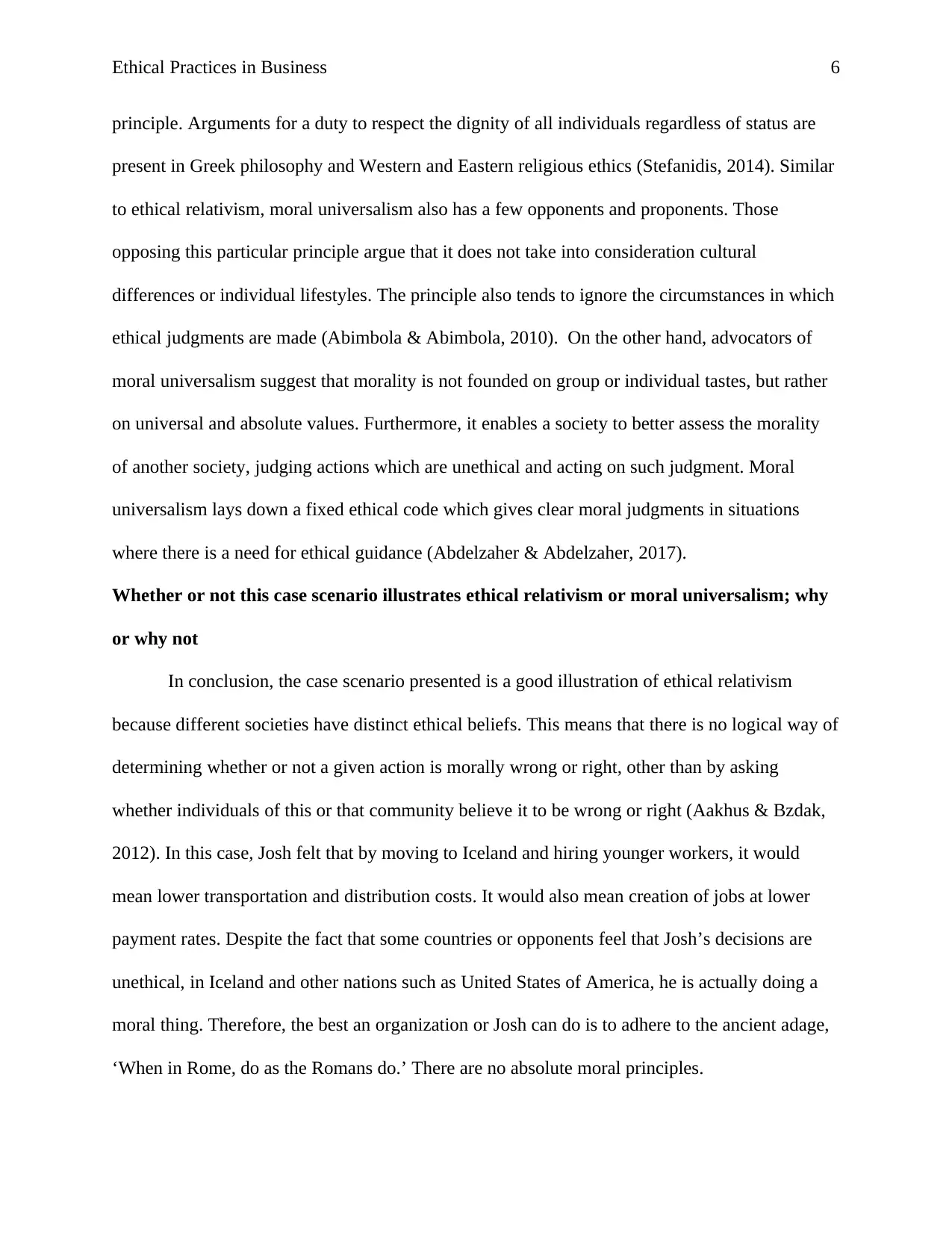
Ethical Practices in Business 6
principle. Arguments for a duty to respect the dignity of all individuals regardless of status are
present in Greek philosophy and Western and Eastern religious ethics (Stefanidis, 2014). Similar
to ethical relativism, moral universalism also has a few opponents and proponents. Those
opposing this particular principle argue that it does not take into consideration cultural
differences or individual lifestyles. The principle also tends to ignore the circumstances in which
ethical judgments are made (Abimbola & Abimbola, 2010). On the other hand, advocators of
moral universalism suggest that morality is not founded on group or individual tastes, but rather
on universal and absolute values. Furthermore, it enables a society to better assess the morality
of another society, judging actions which are unethical and acting on such judgment. Moral
universalism lays down a fixed ethical code which gives clear moral judgments in situations
where there is a need for ethical guidance (Abdelzaher & Abdelzaher, 2017).
Whether or not this case scenario illustrates ethical relativism or moral universalism; why
or why not
In conclusion, the case scenario presented is a good illustration of ethical relativism
because different societies have distinct ethical beliefs. This means that there is no logical way of
determining whether or not a given action is morally wrong or right, other than by asking
whether individuals of this or that community believe it to be wrong or right (Aakhus & Bzdak,
2012). In this case, Josh felt that by moving to Iceland and hiring younger workers, it would
mean lower transportation and distribution costs. It would also mean creation of jobs at lower
payment rates. Despite the fact that some countries or opponents feel that Josh’s decisions are
unethical, in Iceland and other nations such as United States of America, he is actually doing a
moral thing. Therefore, the best an organization or Josh can do is to adhere to the ancient adage,
‘When in Rome, do as the Romans do.’ There are no absolute moral principles.
principle. Arguments for a duty to respect the dignity of all individuals regardless of status are
present in Greek philosophy and Western and Eastern religious ethics (Stefanidis, 2014). Similar
to ethical relativism, moral universalism also has a few opponents and proponents. Those
opposing this particular principle argue that it does not take into consideration cultural
differences or individual lifestyles. The principle also tends to ignore the circumstances in which
ethical judgments are made (Abimbola & Abimbola, 2010). On the other hand, advocators of
moral universalism suggest that morality is not founded on group or individual tastes, but rather
on universal and absolute values. Furthermore, it enables a society to better assess the morality
of another society, judging actions which are unethical and acting on such judgment. Moral
universalism lays down a fixed ethical code which gives clear moral judgments in situations
where there is a need for ethical guidance (Abdelzaher & Abdelzaher, 2017).
Whether or not this case scenario illustrates ethical relativism or moral universalism; why
or why not
In conclusion, the case scenario presented is a good illustration of ethical relativism
because different societies have distinct ethical beliefs. This means that there is no logical way of
determining whether or not a given action is morally wrong or right, other than by asking
whether individuals of this or that community believe it to be wrong or right (Aakhus & Bzdak,
2012). In this case, Josh felt that by moving to Iceland and hiring younger workers, it would
mean lower transportation and distribution costs. It would also mean creation of jobs at lower
payment rates. Despite the fact that some countries or opponents feel that Josh’s decisions are
unethical, in Iceland and other nations such as United States of America, he is actually doing a
moral thing. Therefore, the best an organization or Josh can do is to adhere to the ancient adage,
‘When in Rome, do as the Romans do.’ There are no absolute moral principles.
⊘ This is a preview!⊘
Do you want full access?
Subscribe today to unlock all pages.

Trusted by 1+ million students worldwide
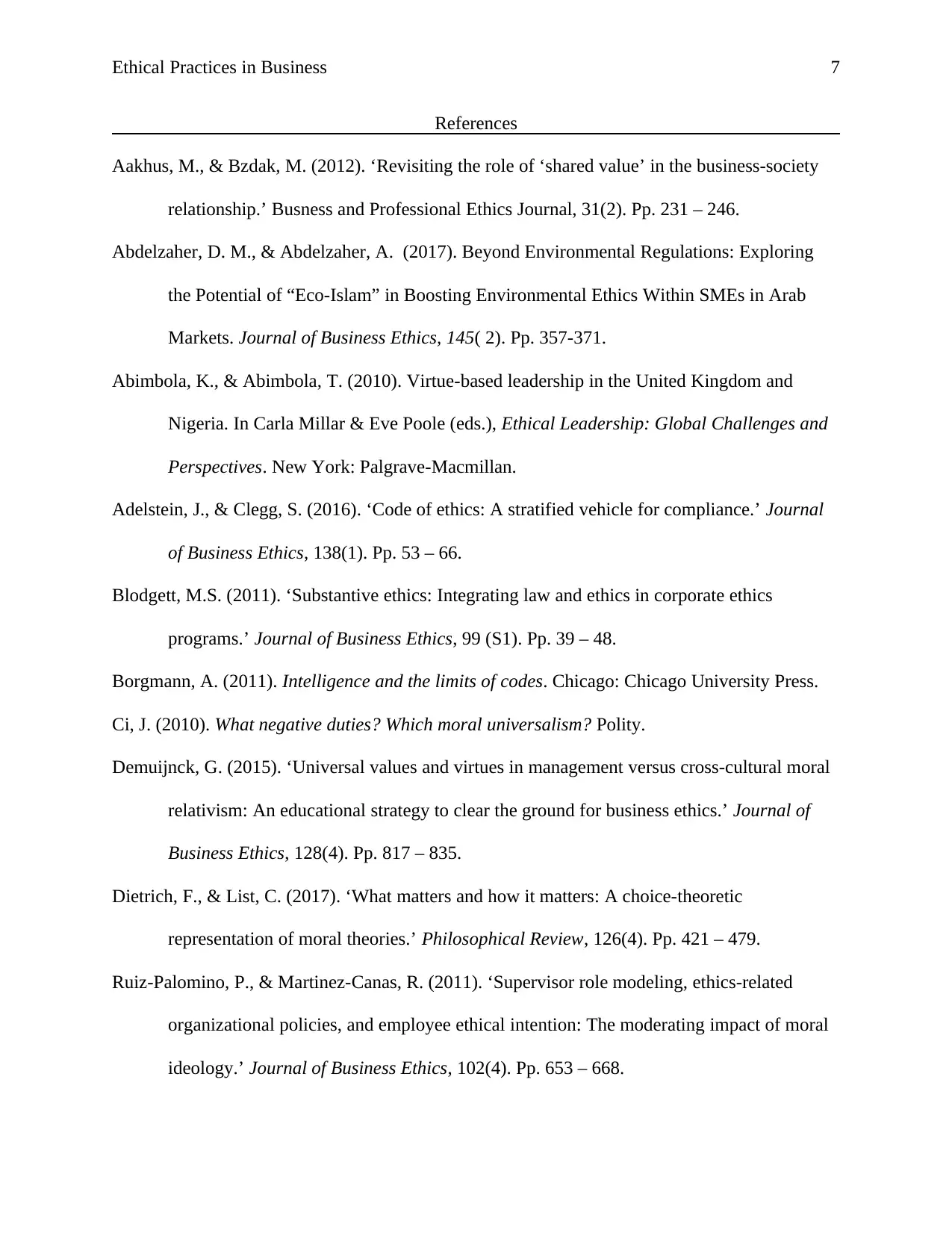
Ethical Practices in Business 7
References
Aakhus, M., & Bzdak, M. (2012). ‘Revisiting the role of ‘shared value’ in the business-society
relationship.’ Busness and Professional Ethics Journal, 31(2). Pp. 231 – 246.
Abdelzaher, D. M., & Abdelzaher, A. (2017). Beyond Environmental Regulations: Exploring
the Potential of “Eco-Islam” in Boosting Environmental Ethics Within SMEs in Arab
Markets. Journal of Business Ethics, 145( 2). Pp. 357-371.
Abimbola, K., & Abimbola, T. (2010). Virtue-based leadership in the United Kingdom and
Nigeria. In Carla Millar & Eve Poole (eds.), Ethical Leadership: Global Challenges and
Perspectives. New York: Palgrave-Macmillan.
Adelstein, J., & Clegg, S. (2016). ‘Code of ethics: A stratified vehicle for compliance.’ Journal
of Business Ethics, 138(1). Pp. 53 – 66.
Blodgett, M.S. (2011). ‘Substantive ethics: Integrating law and ethics in corporate ethics
programs.’ Journal of Business Ethics, 99 (S1). Pp. 39 – 48.
Borgmann, A. (2011). Intelligence and the limits of codes. Chicago: Chicago University Press.
Ci, J. (2010). What negative duties? Which moral universalism? Polity.
Demuijnck, G. (2015). ‘Universal values and virtues in management versus cross-cultural moral
relativism: An educational strategy to clear the ground for business ethics.’ Journal of
Business Ethics, 128(4). Pp. 817 – 835.
Dietrich, F., & List, C. (2017). ‘What matters and how it matters: A choice-theoretic
representation of moral theories.’ Philosophical Review, 126(4). Pp. 421 – 479.
Ruiz-Palomino, P., & Martinez-Canas, R. (2011). ‘Supervisor role modeling, ethics-related
organizational policies, and employee ethical intention: The moderating impact of moral
ideology.’ Journal of Business Ethics, 102(4). Pp. 653 – 668.
References
Aakhus, M., & Bzdak, M. (2012). ‘Revisiting the role of ‘shared value’ in the business-society
relationship.’ Busness and Professional Ethics Journal, 31(2). Pp. 231 – 246.
Abdelzaher, D. M., & Abdelzaher, A. (2017). Beyond Environmental Regulations: Exploring
the Potential of “Eco-Islam” in Boosting Environmental Ethics Within SMEs in Arab
Markets. Journal of Business Ethics, 145( 2). Pp. 357-371.
Abimbola, K., & Abimbola, T. (2010). Virtue-based leadership in the United Kingdom and
Nigeria. In Carla Millar & Eve Poole (eds.), Ethical Leadership: Global Challenges and
Perspectives. New York: Palgrave-Macmillan.
Adelstein, J., & Clegg, S. (2016). ‘Code of ethics: A stratified vehicle for compliance.’ Journal
of Business Ethics, 138(1). Pp. 53 – 66.
Blodgett, M.S. (2011). ‘Substantive ethics: Integrating law and ethics in corporate ethics
programs.’ Journal of Business Ethics, 99 (S1). Pp. 39 – 48.
Borgmann, A. (2011). Intelligence and the limits of codes. Chicago: Chicago University Press.
Ci, J. (2010). What negative duties? Which moral universalism? Polity.
Demuijnck, G. (2015). ‘Universal values and virtues in management versus cross-cultural moral
relativism: An educational strategy to clear the ground for business ethics.’ Journal of
Business Ethics, 128(4). Pp. 817 – 835.
Dietrich, F., & List, C. (2017). ‘What matters and how it matters: A choice-theoretic
representation of moral theories.’ Philosophical Review, 126(4). Pp. 421 – 479.
Ruiz-Palomino, P., & Martinez-Canas, R. (2011). ‘Supervisor role modeling, ethics-related
organizational policies, and employee ethical intention: The moderating impact of moral
ideology.’ Journal of Business Ethics, 102(4). Pp. 653 – 668.
Paraphrase This Document
Need a fresh take? Get an instant paraphrase of this document with our AI Paraphraser
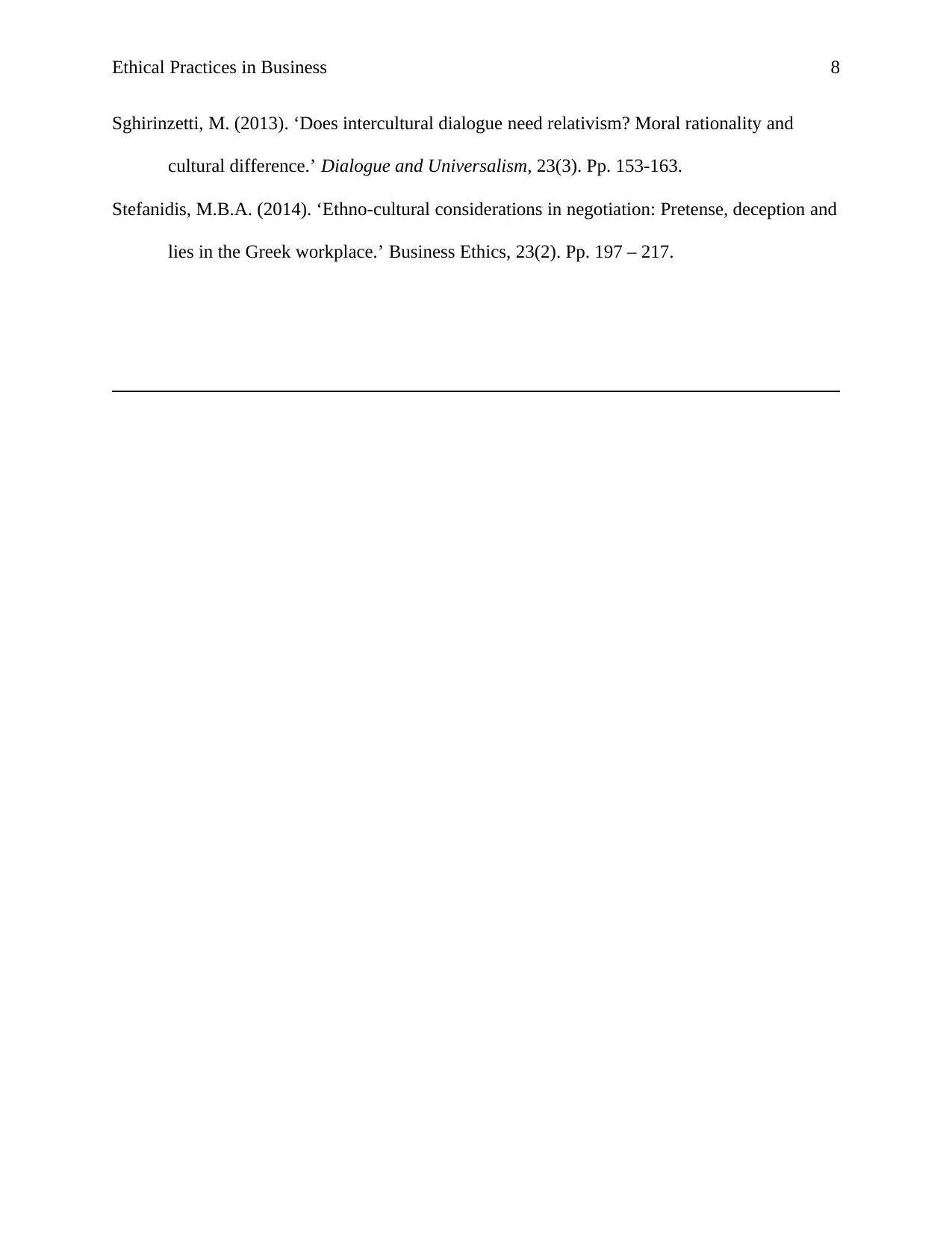
Ethical Practices in Business 8
Sghirinzetti, M. (2013). ‘Does intercultural dialogue need relativism? Moral rationality and
cultural difference.’ Dialogue and Universalism, 23(3). Pp. 153-163.
Stefanidis, M.B.A. (2014). ‘Ethno-cultural considerations in negotiation: Pretense, deception and
lies in the Greek workplace.’ Business Ethics, 23(2). Pp. 197 – 217.
Sghirinzetti, M. (2013). ‘Does intercultural dialogue need relativism? Moral rationality and
cultural difference.’ Dialogue and Universalism, 23(3). Pp. 153-163.
Stefanidis, M.B.A. (2014). ‘Ethno-cultural considerations in negotiation: Pretense, deception and
lies in the Greek workplace.’ Business Ethics, 23(2). Pp. 197 – 217.
1 out of 8
Related Documents
Your All-in-One AI-Powered Toolkit for Academic Success.
+13062052269
info@desklib.com
Available 24*7 on WhatsApp / Email
![[object Object]](/_next/static/media/star-bottom.7253800d.svg)
Unlock your academic potential
Copyright © 2020–2026 A2Z Services. All Rights Reserved. Developed and managed by ZUCOL.





